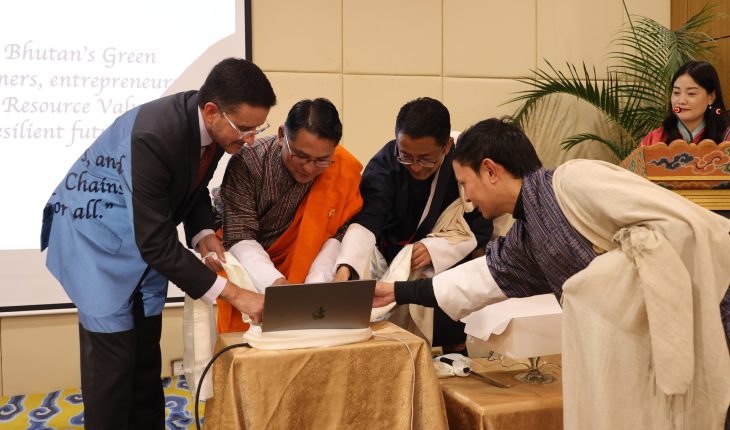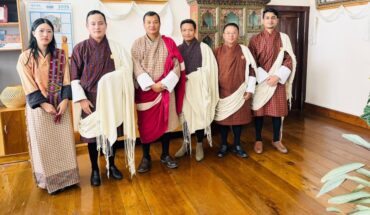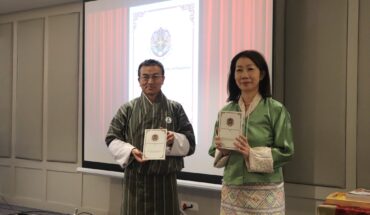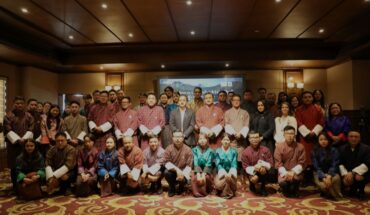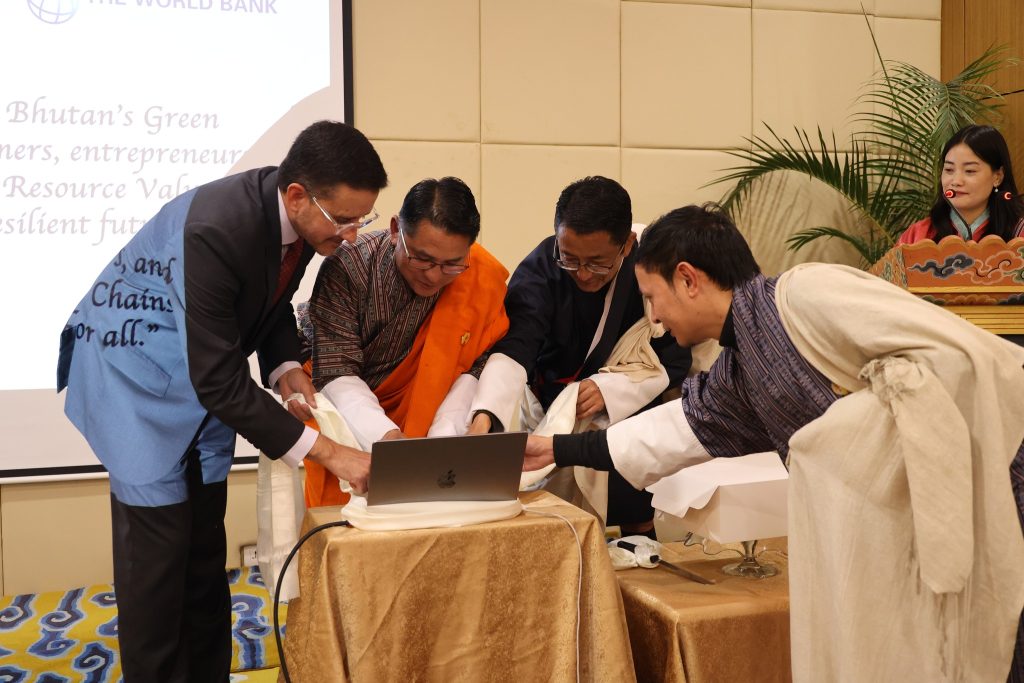
The initiative aims to boost rural livelihoods, empower women, and strengthen climate-smart agriculture.
TIL BDR GHALLEY | Thimphu
Bhutan has launched an ambitious five-year initiative aimed at transforming employment and productivity in the Renewable Natural Resource (RNR) sector through a USD 34.7 million project supported by the World Bank.
The “Accelerate Bhutan’s Job Transformation through Renewable Natural Resource (RNR) Value Chains Project”, launched jointly by the Ministry of Agriculture and Livestock (MoAL), the World Bank, the Ministry of Health, and the Ministry of Energy and Natural Resources, seeks to drive economic transformation and create sustainable jobs in rural Bhutan.
The project aligns with Bhutan’s 13th Five-Year Plan and long-term national goals of achieving inclusive, green, and resilient growth. It focuses on enhancing value addition and employment in selected RNR value chains, including dairy, citrus, potatoes, and forest-based products.
“The project is designed to enhance agrifood systems, promote sustainable forestry, and create better job opportunities in rural areas,” the Minister of Agriculture and Livestock, Younten Phuntsho, stated during the launch.
The World Bank-funded initiative aims to benefit about 42,000 individuals, of which 65 percent are women, by boosting productivity, improving market access, and developing competitive agricultural value chains.
This project not only symbolises the strong partnership between the Royal Government of Bhutan and the World Bank but also reflects our shared belief that farmers, youth, and entrepreneurs are at the heart of Bhutan’s economic transformation,” added Lyonpo Younten Phuntsho.
According to project documents, the Project Development Objective (PDO) is “to increase value addition and employment in selected RNR value chains in Bhutan.” Its impact will be measured by the net incremental value of sales by value chain actors and the number of new or better jobs created, with a focus on women and youth participation.
The Minister explained that the initiative supports Bhutan’s vision to strengthen agrifood systems, promote sustainable forestry, and open new opportunities for farmers and entrepreneurs in the RNR sector.
The total project cost of USD 34.7 million includes USD 29.8 million from the International Development Association (IDA) through a combination of grant, credit, and shorter-maturity loan, and an additional USD 4.7 million grant from the Global Partnership for Sustainable and Resilient Landscapes Multi-Donor Trust Fund (PROGREEN).
The project will be implemented over a five-year period, commencing in Fiscal Year 2025–26 and scheduled for completion by 2030. It will be jointly executed by the Ministry of Agriculture and Livestock (MoAL), the Ministry of Energy and Natural Resources (MoENR), and the Ministry of Health (BFDA). Oversight will be provided by a Project Steering Committee and Technical Working Group to ensure accountability, coordination, and progress monitoring.
The first key component focuses on sustainable agricultural production in targeted value chains—particularly dairy, potato, and citrus—and has a total allocation of USD 8.7 million. The project will promote climate-smart agricultural (CSA) technologies, mechanisation, and best practices to increase labour productivity and farm efficiency.
The initiative will also focus on dairy breed improvement, strengthening artificial insemination services, and promoting better animal nutrition and management. It will help farmers adopt biogas digesters for cleaner energy and reduce drudgery through labour-saving machinery such as mini tillers, brush cutters, and potato diggers—particularly benefiting women farmers.
The Minister stated that this component aims to “support labour productivity improvements, mechanisation, climate-smart agriculture, and sustainable animal practices, while developing standardisation and grading systems for production.”
The second component, with an investment of USD 11.7 million, focuses on building productive partnerships between producers and buyers through offtake agreements that improve market access and post-harvest practices.
Under this scheme, producers and buyers will jointly develop business plans, supported by matching grants from the project and contributions from beneficiaries. The approach is designed to strengthen commercial linkages between producer organisations, RNR enterprises, and markets, ensuring better price realisation and reduced post-harvest losses.
According to the Minister, these partnerships “will consolidate commercial linkages between producers and buyers, promoting value addition, improving quality standards, and enhancing the competitiveness of Bhutanese products in domestic and export markets.”
The third component—Institutional Strengthening Plans for Enhancing Institutional Capacity—is the largest, with an investment of USD 15.9 million. This component seeks to improve policies, institutional frameworks, and digital services that support value chain development and private sector investment.
The project will strengthen quality infrastructure for certification, laboratory services, and export compliance—key areas that determine market access for Bhutanese agricultural products. It will also invest in digital farm advisory services, input delivery systems, and strategies for climate-smart agriculture and trade facilitation.
The Minister stated that the component aims “to create an enabling environment by developing strategies and policies for value chain development, investing in digital farm advisory and input delivery services, and strengthening quality infrastructure for certification, laboratory services, and export compliance.”
In addition, the initiative will de-risk potential investments in emerging value chains that show market potential, building Bhutan’s competitiveness in premium agricultural markets and fostering innovation.
The fourth component, Project Management, Monitoring and Evaluation, and Learning, will utilise USD 1.9 million to ensure effective coordination, transparency, and data-driven decision-making. It includes baseline studies, annual outcome surveys, and project progress reviews to measure achievements and identify lessons for policy refinement.
A dedicated Project Management Unit (PMU) will oversee implementation, comprising a Project Director, Monitoring and Evaluation Expert, Procurement Expert, Financial Expert, Environment and Social Safeguard Specialist, and a Productive Partnership Coordinator.
According to the MoAL, “project management, monitoring, and evaluation will ensure effective implementation, track the project’s impact, facilitate learning exchanges, and support stakeholder engagement.”
By linking farmers, enterprises, and institutions, the RNR Value Chains Project is expected to transform Bhutan’s agricultural landscape and create a more competitive and resilient rural economy. The focus on climate-smart agriculture, women’s empowerment, and private sector engagement positions the initiative as a key pillar in Bhutan’s economic transformation agenda.
The project highlighted that the project “will drive sustainable economic growth and enhance Bhutan’s competitiveness in both domestic and export markets by facilitating private sector engagement and investment in RNR enterprises.”
Through its integrated approach—spanning production, partnerships, and institutional strengthening—the project aims to modernise Bhutan’s RNR sector while preserving its ecological integrity. It envisions a future where farmers have access to technology, markets, and finance, and where rural communities can thrive through innovation, resilience, and inclusive growth.
“There is no way we can build a resilient and prosperous Bhutan if our villages are left behind, and no way we can talk about inclusive growth if our youth do not find dignity and opportunity in the agriculture sector,” said Lyonpo Younten Phuntsho.
As Bhutan moves forward with implementation, the “Accelerate Bhutan’s Job Transformation through Renewable Natural Resource Value Chains Project” marks a significant milestone in realising the nation’s vision of self-reliance, green growth, and sustainable prosperity.

